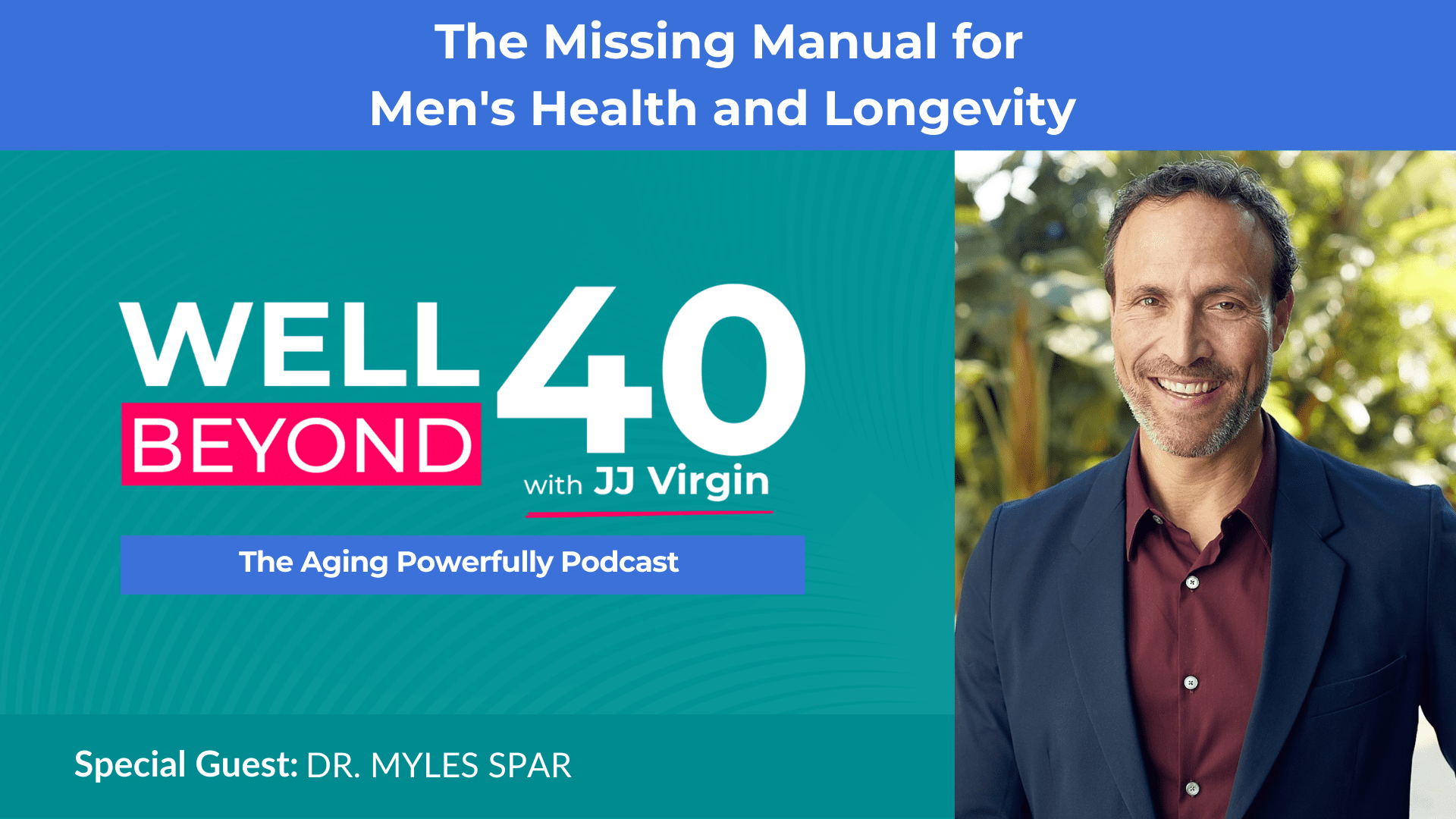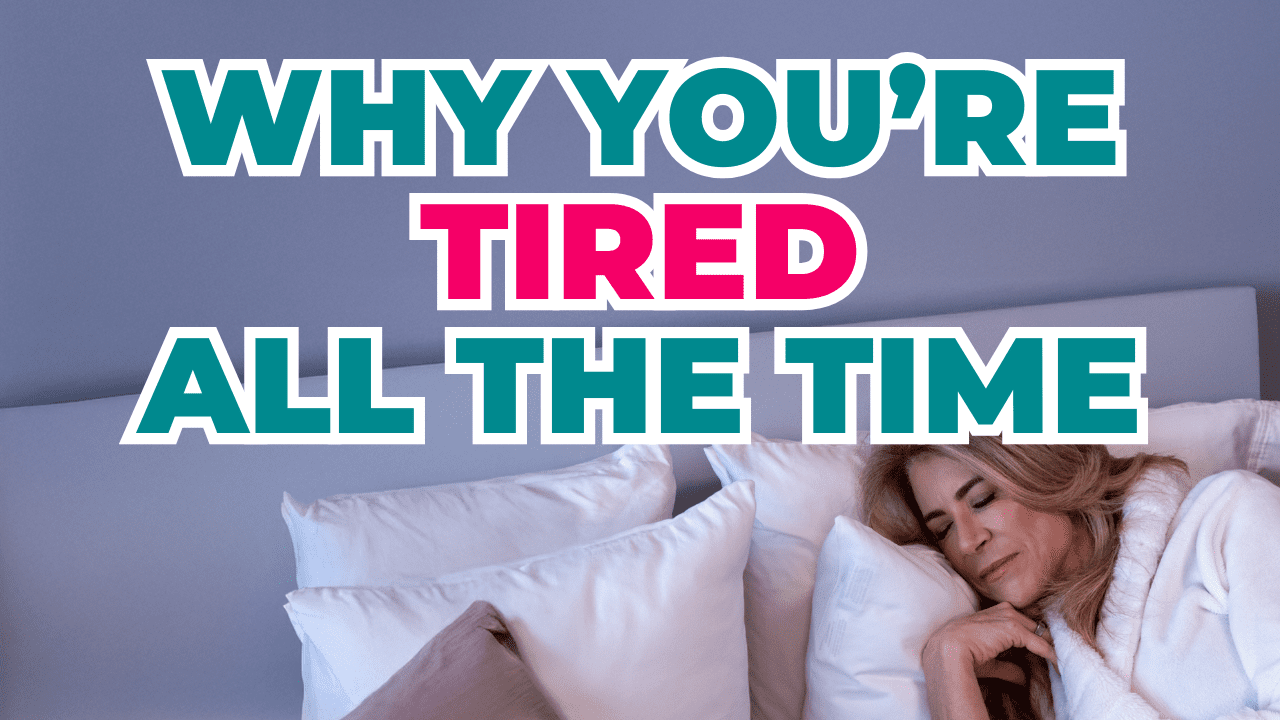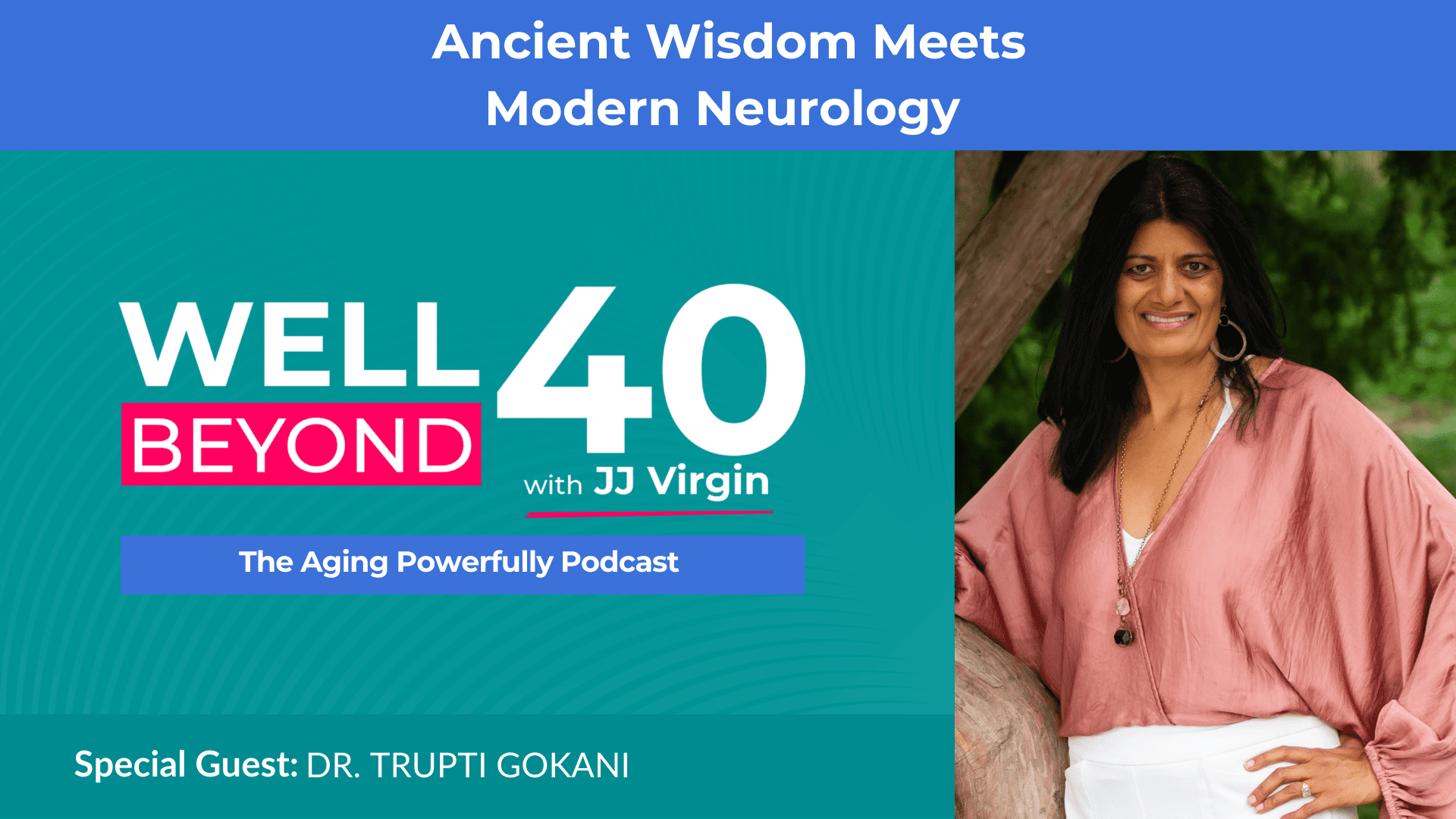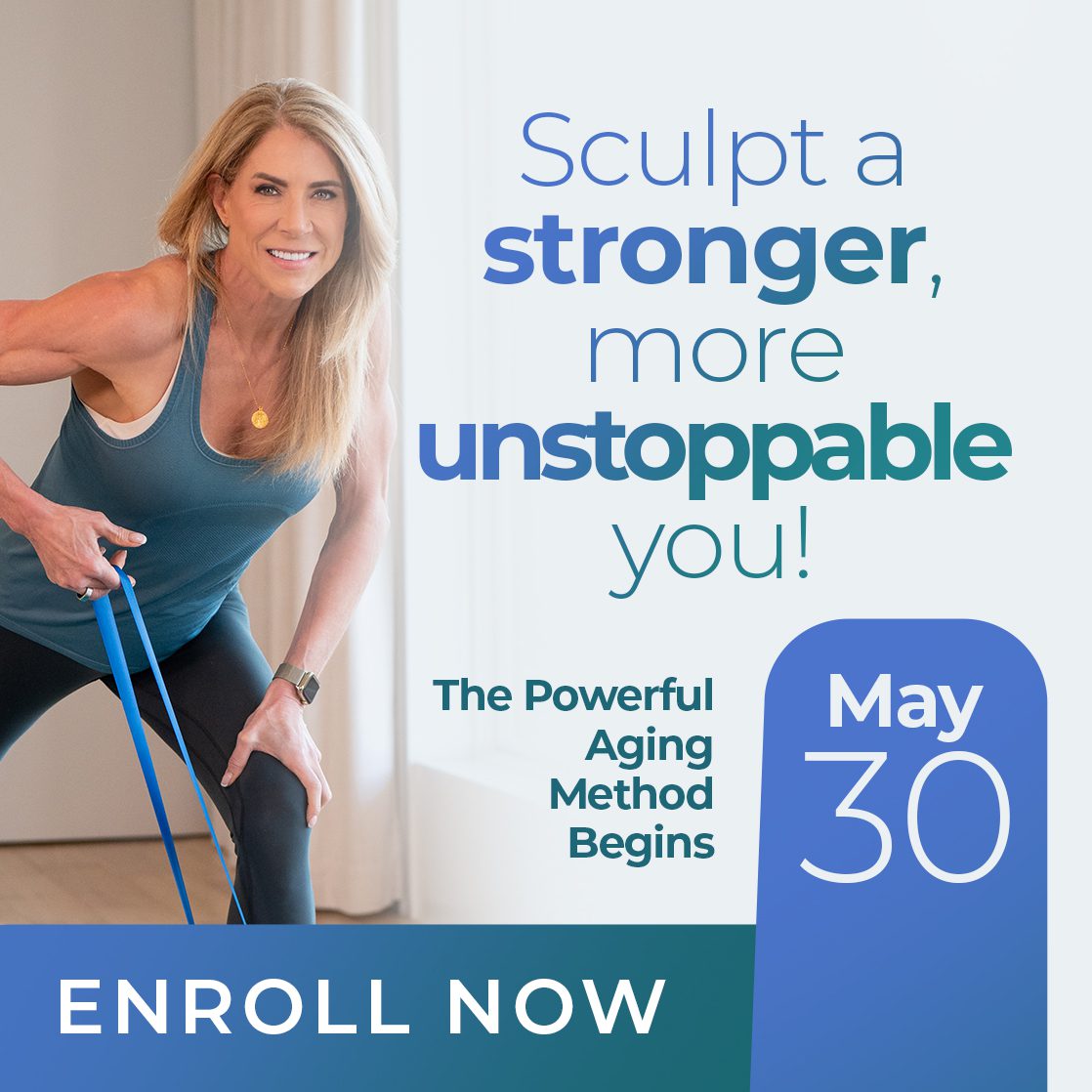Get Proactive About Protecting Your Vitality, Energy, and Power
Did you know that postmenopausal women are at a significantly higher risk of conditions like osteoporosis, heart disease, and dementia? On top of that, we often deal with brain fog, chronic inflammation, bloating, and other frustrating symptoms.
The good news is you don’t have to sit back and accept it.
You can start protecting yourself against these risks right now. Based on years of research, I created a supplement regimen that makes me feel better now than I did in my 20s. In this episode, I’m sharing my top five supplements for post-menopausal women, so you can feel your best, too. I’m betting that most of these will be new to you, so have a listen (and be sure to talk to your doctor about anything you incorporate into your routine).
Timestamps
00:01:15 – How to combat these serious post-menopause health risks
00:01:53 – One of my favorite multi-benefit supplements for menopause
00:03:48 – This compound is found in flax seeds, olive oil, and tomatoes
00:05:56 – When estrogen goes sideways, try this
00:08:17 – Look for these ingredients to maximize benefits
00:09:50 – This can improve digestion and reduce discomfort
00:11:18 – Stop this supplement immediately if you notice this symptom
00:12:10 – This is the supplement I am obsessed with
Resources Mentioned in this episode
Watch the FULL VIDEO on my YouTube Channel
Download The Ditch List: 7 Foods Harming Your Health
Learn how foods cause leaky gut in The Virgin Diet
Read my book, The Sugar Impact Diet
Try Reignite Wellness™ Protein First Enzymes
Reignite Wellness™ Clean Creatine Powder
Get loaded smoothie recipes in my Eat Protein First Smoothie Guide
Designs for Health KreAlkalyn Pro
Video: Feel Great & Lose Weight After Menopause!
ATHE_Transcript_Ep 622_5 Daily Supplements Post-menopausal Women Should Be Taking
JJ Virgin: [00:00:00] I’m JJ Virgin, PhD dropout, sorry mom, turned four time New York Times best selling author. Yes, I’m a certified nutrition specialist, fitness hall of famer, and I speak at health conferences and trainings around the globe. But I’m driven by my insatiable curiosity and love of science to keep asking questions, digging for answers, and sharing the information I uncover with as many people as I can.
And that’s why I created the Well Beyond 40 podcast to synthesize and simplify the science of health into actionable strategies to help you thrive. In each episode, we’ll talk about what’s working in the world of wellness, from personalized nutrition and healing your metabolism to healthy aging and prescriptive fitness.
Join me on the journey to better health so you can love how you look and feel right now and have the energy to play full out at 100.[00:01:00]
Did you know that postmenopausal women are at a significantly higher risk of conditions like osteoporosis, heart disease, and dementia? And that’s compared to, of course, our younger counterparts. I mean, this is true. We can’t ignore it, but here’s the deal. With the right support, you can actively combat these risks and ensure your post menopausal years are literally filled with vitality, with energy, and with power.
The years after menopause have already been some of the very best of my life. In fact, I joke that if I had known it would be this great now, I would have just like skipped ahead in my twenties. And it’s been with the help of this supplement regimen that I’ve been working on and curating after years of research in women’s health and nutrition.
So I’m going to share my top five with you. And here’s what’s cool. I’m betting that most of these, if not all of these, will be new to you. So, first up is annatto. Now, annatto is one of my most favorite supplements for menopause. It comes [00:02:00] from the seeds of the annatto tree and it’s a rich source of vitamin E called tocotrienols.
Vitamin E has two different types, it has tocopherols and it has tocotrienols. Now, you’ve probably heard of tocopherols, but the real powerhouse here are these tocotrienols. They’re a potent source of antioxidants that can help fight those damaging free radicals that can lead to oxidative stress. And that can be caused by declining estrogen levels.
Left unchecked, oxidative stress can lead to chronic disease. Now, annatto can also help lower chronic inflammation that can contribute to osteoporosis because around menopause, you have an increased risk of osteoporosis due to those hormonal changes that affect bone density. So annatto can help support strong bones.
And then there’s heart health. And the reality is we get really concerned about. Breast cancer, but more than 50 percent of us will die of heart disease. It’s a major concern around menopause because we have these changes in [00:03:00] cholesterol and triglycerides that increase the risk of heart disease. There are antioxidants called carotenoids and annatto that can lower the risk of cardiovascular disease by reducing inflammation and improving your lipid profiles.
Now, these carotenoids can also help maintain good eye health. They can protect against age related macular degeneration and cataracts, and these are both more common in postmenopausal women. And then, there’s skin. We have more sensitive skin around menopause, too, due to these hormonal changes.
Carotenoids can help protect your skin from the ultraviolet radiation and reduce signs of aging like wrinkles and age spots. It’s literally beauty from the inside out. Now, finally, these carotenoids in the annatto plant may positively impact mood and cognitive function. Now, there is another compound found in annatto, and I know for sure you haven’t heard of this one.
This is found in annatto. It’s found in black seeds. Olive oil and tomatoes and it is called Geranyl Geranyl. [00:04:00] This is a compound that’s part of the pathway to make CoQ10. Now you probably heard about CoQ10, it’s like one of the most popular supplements out there. Super great for heart health and energy.
As you age, your ability to produce Geranyl Geranyl goes down. And it goes down even more if you’re taking things like statins or antibiotics. Taking GG has multiple health benefits. First, it can help support bone health. Now, during menopause, hormonal changes can increase the risk of osteoporosis and bone loss.
GG can help maintain bone density by supporting the cells responsible for bone formation. These are called osteoblasts. GG also plays a role in heart health, which is super important because, again, postmenopause, Can bring all these unfavorable changes in cholesterol levels and increased inflammation which, of course, impacts cardiovascular health.
GG has the potential to regulate cholesterol levels and reduce inflammation, which is going to help keep your heart [00:05:00] strong and healthy. It also has positive effects on skin and hair. It can reduce dryness and promote collagen production, which is essential protein for maintaining healthy skin and hair.
Collagen production is going to naturally decline with age. So this can give you a little boost. And there’s even more benefits. Some research suggests that GG can possibly affect cognitive function and memory. Now, anyone who’s gone through menopause knows that feeling when you walk into a room and you’re like, why the heck did I just walk in here?
And then you start to go, Oh, what’s going on here? And this is important because menopause is associated with an increased risk of cognitive decline and Alzheimer’s disease. GG is great for your brain. Now, to get the most out of GG, consider a combo supplement that includes annatto. And you’re going to want to take it with a meal just like the annatto tocotrienols because it’s a fat soluble nutrient.
All right, another thing that goes sideways during menopause. [00:06:00] Is the balance of estrogen, right? You get this imbalance of estrogen, low estrogen. You also have poor estrogen metabolism, and sometimes you’re producing more of the estrone, more of what we call the bad estrogen. And so this is where something called diindlylmethane.
Or DIM can come to the rescue. DIM is a compound found in cruciferous vegetables like broccoli, cabbage, and cauliflower. These vegetables contain sulfur rich compounds called glucosinolates, and these glucosinolates support detoxification, they support your good antioxidant status, they support great collagen production, and more.
Now, enzymes in the body convert glucosinolates into a substance called I3C. And then, in the body, it’s converted into DIM. Now, you can get DIM in your diet by consuming cruciferous vegetables, and it’s one of the reasons I encourage eating lots of these, especially things like broccoli and broccoli sprouts.
But I also recommend supplementing with DIM, [00:07:00] because then we know that, yeah, get what you need, right? Possibly you’re not eating broccoli sprouts every day, let’s be honest. Plus, with supplements, you get the benefits directly without the need for your body to go through the conversion process. This can be particularly beneficial for addressing symptoms associated with declining estrogen levels during menopause like hot flashes, mood swings, and changes in bone density.
DIM helps balance estrogen levels by converting estrogen into its less harmful forms. which can potentially alleviate menopausal symptoms and reduce the risk of estrogen related health problems. Now, research also suggests that DIM can offer protection against breast cancer by influencing estrogen metabolism.
Specifically, DIM shifts the balance of estrogen metabolites towards forms that are less likely to promote the growth of breast cancer cells, making estrogen less harmful in this context. DIM also supports the cells responsible for bone formation, which can contribute to better [00:08:00] bone health. And, DIM is effective at reducing inflammation, which of course is a risk factor for heart disease and other conditions related to menopause.
DIM also has antioxidant properties which can help protect your skin from issues like dryness and reduce collagen production that are common during menopause as well. So to maximize the benefits of DIM supplements, you are going to want to look for ingredients like delta and gamma tocotrienols and medium chain triglycerides, MCTs.
in the supplement because those are going to make it more available. It’s going to help improve its absorption. You’re also going to want to take this one with a meal too with fat, just like you did with the GG and the tocotrienols to improve its absorption. Talking about meals, as we age, our digestive enzymes tend to decline.
Plus, of course, we know stress impacts our enzymes as well. And this is why I recommend you do a trial of digestive enzymes if you’re a 40 plus. Digestive enzymes are [00:09:00] produced by your pancreas and other organs and play a vital role in breaking down the foods you eat into smaller, more absorbable parts.
But as we age, our ability to digest and absorb nutrients from our meals can change, especially with protein. So this is where digestive enzyme supplements come into play. These supplements provide your body with important digestive enzymes like amylase, protease, and lipase, which can help your body break down food efficiently.
Those break down carbs, proteins, and fats, respectively. Now, when you’re digesting these macronutrients properly, you end up getting more essential nutrients. They can keep you thriving, especially during the menopause phase. Think of it as crucial nutrients like calcium and vitamin D, which of course we know are essential for maintaining strong bones.
Let’s face it, during this transition, you’re more likely to experience some uncomfortable moments after meals, right? Like bloating and gas and indigestion. [00:10:00] Sometimes you eat protein and you just feel like it’s just sitting there. And that’s where digestive enzyme supplements can come in and really save your gut.
They can make digestion smoother and reduce that post meal discomfort. Another potential concern is that you can develop food sensitivities as you age, making certain foods harder to digest. And that’s another place that enzymes can come to the rescue. They can help you handle those problematic ingredients like gluten, And they can make your overall digestion experience better.
If you want to know more about what those problematic foods might be for you, this is what I wrote The Virgin Diet about. I discovered over years that there were seven foods that were the most common to create some digestive distress. So we have the ditch list. It’s a free cheat sheet on the seven foods that could be harming your health.
So we’ll make sure that you can grab that. Now, just to be clear, These supplements won’t magically let you eat anything you want without consequences. I want to make sure you [00:11:00] absolutely know that. It’s not like, grab the gluten, eat the pasta. But they can certainly help you feel better if you accidentally consume something that doesn’t agree with you.
And you know, when you’re eating out, you don’t always know what you’re getting. And for the best results, it’s a good idea to take enzymes about 15 to 20 minutes before your meals. If you happen to choose a supplement with betaine HCL, keep a close eye on how your body reacts. A little bit of mild discomfort, like a warm sensation or slight stomach burning, slight, is usually normal and shows that the supplement’s doing its job.
But, if you experience severe discomfort or pain, you gotta stop that right away. Now, If you don’t feel any discomfort after a few days, titrate up the dose so that you can find that right place for you. When I started using betaine, I started with one before each meal, and then I ended up having to take four for a while till I got my digestion back on track.
Now I can do it with one to two at each meal. So play around with what works best for you. But the difference when you take digestive [00:12:00] enzymes can be amazing. It can help with everything from gas and bloating to your skin. Things like rosacea and acne can be improved by improving your digestion. All right, now my top supplement for postmenopausal women.
I have definitely saved the best for last. I am obsessed with this. I take this every single day without fail to ensure that I keep my tissues saturated. What am I talking about? Creatine. Creatine is a naturally occurring compound found in small amounts. And certain foods and it’s produced by your body as well.
Now you’re probably thinking, hold on. I thought that was for athletes and for bodybuilders. I don’t want to get bigger, but there are so many benefits for women over 40, especially during menopause. Now around menopause. We have a tendency to lose muscle mass, strength, and power, right? It’s called sarcopenia.
Along with resistance training, creatine is great for [00:13:00] helping to reduce muscle mass loss and enhance muscle strength. But creatine isn’t just about muscles. It has additional benefits. For one, it plays an important role in bone health. Again, osteoporosis with its lower bone density and higher fracture risk is a huge concern during menopause.
Creatine can improve bone mineral density, strengthening your bones, and reducing fracture risk. Who would have known this, it helps with brain health. Again, another thing that happens during menopause is cognitive decline and age related neurological conditions like Alzheimer’s. Creatine supports cognitive function by aiding energy production.
It helps produce adenosine triphosphate, that’s ATP. This is your primary energy currency in your body. Now in the brain, ATP fuels energy demanding processes like the production of neurotransmitters. This energy source can be especially helpful during times of stress or when your body needs a little extra boost.
And speaking of [00:14:00] energy, you probably noticed that menopause can bring about a little fatigue and just general overall decreased energy levels. And creatine can help counteract this by increasing energy levels and reducing feelings of fatigue. It can also have a positive impact on insulin and insulin resistance, potentially lowering the risk of blood sugar imbalances.
And here’s the big thing. Women have 70 to 80 percent lower tissue stores of creatine than men. It’s even more important for us. So here’s what you’re going to want to do with it. I like to use the powdered form because I like to throw it into my smoothies. And then when I travel, I’ll travel with pills just to make sure that I don’t miss a dose.
Again, I am. Really consistent with this. The powder’s flavorless. You’re not even going to notice it. So you can mix it into your coffee, into your favorite drink, into your smoothie. I do it in a loaded smoothie. Now, when it comes to dosing, you can either do three to five grams a day, or you can do [00:15:00] 0. 06 grams per kilogram of body weight, which is going to get you into that three to five grams a day range.
What’s most important here is that you are consistent. It’s going to take you about a month to saturate your tissues with creatine. So you’ve really got to take it every day. If you want a shortcut that month. You can do what’s called a loading phase. And so for five days, what you do is you take five grams, four times a day.
Now, sometimes that can give you a little GI distress. And if that’s the case, there’s another form of creatine called crealcolin, K R E A. L K Y N that you can use during that loading phase because it just gets rid of the GI distress. I will tell you of all the supplements that I’ve used, this is the one that I’ve really noticed crazy improvements on.
These are my Fab Five for menopause. They can make a real difference as you navigate the twists and turns of getting older, and most importantly, They can help ensure [00:16:00] that you are aging powerfully. Now, if one of your goals with this supplement regimen is to deal with the weight gain that often comes around this time, you’re going to want to watch this next video on how to feel great and lose weight after menopause.
I promise it’s possible. Be sure to join me next time for more tools, tips, and techniques you can incorporate into everyday life to ensure you look and feel great, and more importantly, that you’re built to last. And check me out on Instagram, Facebook, YouTube. And my website, jjvirgin.com. And make sure to follow my podcast so you don’t miss a single episode at subscribetojj.com. See you next time.
Hide Transcript
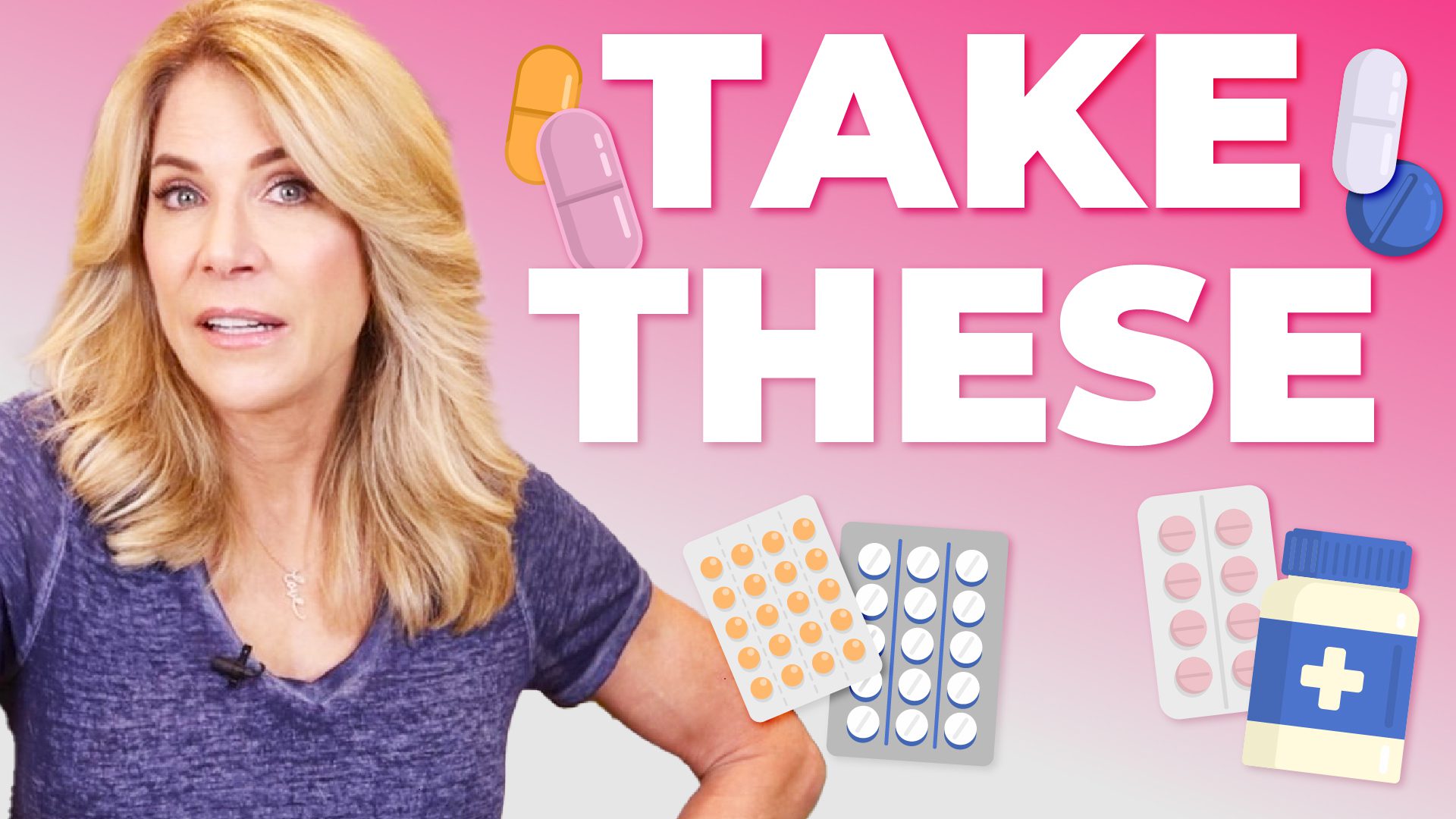
 Subscribe to our show
Subscribe to our show 